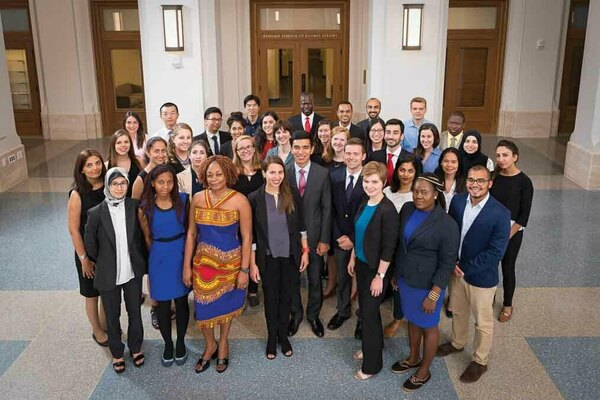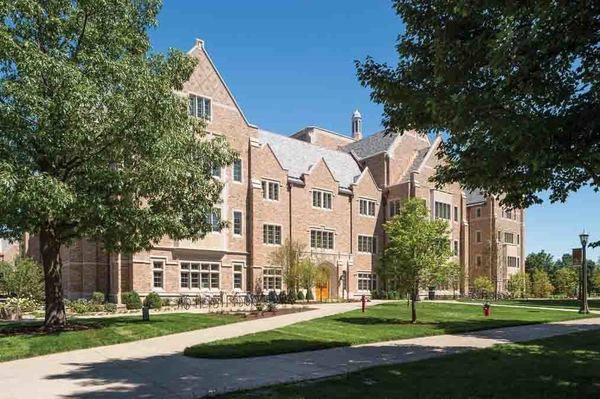
The Donald R. Keough School of Global Affairs, Notre Dame’s first new school in nearly a century, has opened its doors to Notre Dame and the world.
Housed in the newly completed Jenkins Hall on Notre Dame Avenue, the Keough School is a key player in fulfilling the University’s goal of internationalization.
 The Keough School of Global Affairs is housed in Jenkins Hall, conjoined with Nanovic Hall on Notre Dame Avenue.
The Keough School of Global Affairs is housed in Jenkins Hall, conjoined with Nanovic Hall on Notre Dame Avenue.
Given this goal, it is fitting that the Keough School’s new Master of Global Affairs program enrolls 38 students from 22 countries.
Students hail from Afghanistan, Canada, Chile, China, Colombia, Egypt, Iran, Kenya, Mali, Morocco, Nigeria, Pakistan, Palestine, the Philippines, Sierra Leone, South Africa, Tajikistan, Ukraine, the United States, Uzbekistan, Vietnam and Zimbabwe.
With an average age of 27, the inaugural master’s class brings a wealth of professional experience in international development, education, peacebuilding, environmental conservation, human rights, humanitarian assistance, youth advocacy, journalism and other fields.
“The students are extraordinarily gifted and well prepared for the rigors of academic life at Notre Dame,” says Scott Appleby, Marilyn Keough Dean of the Keough School. “Equally important, they chose Notre Dame and the Keough School because they seek to ground their professional preparation by engaging the deeper ethical questions underlying the work of human development.”
While mastering foundational courses in economics and integral human development (see sidebar), the students also choose a concentration in international development, international peace studies or global affairs.
A weekly global policy seminar brings the students together with influential policymakers from around the world. Speakers for the fall 2017 semester include Denis McDonough, Keough School executive policy fellow and former White House chief of staff for President Barack Obama; Horst Koehler, former president of Germany; and Laura Alfaro, former minister of national planning and economic policy for Costa Rica.
To guide students in bridging academic theory with real-world practice, the Keough School offers an Integration Lab (i-Lab), led by co-directors Tracy Kijewski-Correa, the Leo E. and Patti Ruth Linbeck Collegiate Chair and associate professor of civil and environmental engineering and earth sciences, and Steve Reifenberg, associate professor of the practice of international development.
Students, drawing on several disciplines, engage with a global partner organization and develop professional-quality projects and solutions based in part on internships with the partner.
Now that the master’s program is in place, the school is preparing a full undergraduate program, which will launch in the fall of 2018. The program will complement students’ disciplinary majors and include gateway courses, a policy seminar, advanced language courses and an experiential component.
“The undergraduate program in global affairs is designed to globalize the disciplinary major, whether it be political science, history, anthropology or sociology,” Appleby says.
Leadership and faculty
A professor of history who joined the Notre Dame faculty in 1994, Appleby was appointed dean when the Keough School was first announced in 2014. The school’s leadership also includes a trio of associate deans: Ted Beatty, associate dean for academic affairs, Hal Culbertson, associate dean for operations, and Sara Sievers, associate dean for policy and practice.
Students are taught by a diverse array of faculty with expertise in development economics, comparative regional and international politics, peacebuilding, human rights, global religions, social ethics, international trade and development practice. New faculty hired since the Keough School was established include:
• Ebrahim Moosa, a leading scholar of the study of Islamic history, philosophy and theology;
• Michel Hockx, a scholar of literary Chinese language and Internet culture, who serves as the director of the Liu Institute for Asia and Asian Studies;
• Tamara Kay, a sociologist with extensive experience in Latin America and Africa and expertise in regional economic integration;
• Ray Offenheiser, a widely known nonprofit leader and innovator who served as CEO and president of Oxfam America for 20 years;
• Lakshmi Iyer, an expert in development economics who holds a joint appointment with the Department of Economics;
• Maura Policelli, former chief of staff at Oxfam America with 20 years of experience in U.S. national politics, public policy, and communications on and off Capitol Hill;
• Susan Ostermann, a sociologist with expertise in comparative politics in South Asia;
• Clemens Sedmak, a professor of social ethics whose scholarship spans philosophy and theology and engages Catholic social tradition.
The school’s newest faculty hires complement the extensive expertise already present among Notre Dame’s faculty from several disciplines and departments across campus, many of whom are faculty or fellows of the international institutes that form the foundation for the school, Appleby said.
Focus on policy
The school’s newly established Global Policy Initiative reflects one of the Keough School’s top priorities: to advance high-impact academic research and sound public policy and to influence decision-making in governments, corporations and nongovernmental humanitarian organizations around the world.
Sievers and Policelli have primary responsibility for overseeing the Global Policy Initiative. Special Advisor for Policy Studies David Cortright and Executive Policy Fellow Francis Taylor are also key leaders. General Taylor joined the Keough School this fall; he is the former undersecretary for intelligence and analysis in the U.S. Department of Homeland Security (DHS), where he also served as DHS counterterrorism coordinator.
The initiative brings policy studies scholars and distinguished diplomats, foreign policy experts and other public officials to Notre Dame to teach and mentor students. Policelli is currently working to establish an office for the initiative in Washington, D.C., to provide more opportunity for engagement with policy experts and government officials.
“Over time we intend to enhance Notre Dame’s voice in the conversations and debates that will decide the future of international education, the treatment of migrants, efforts to reduce poverty, and plans to bring peace to troubled regions and nations,” Appleby says.
Centers and institutes
The Keough School brings together seven outstanding international units that bring expertise on various dimensions of integral human development: the Center for Civil and Human Rights, the Kellogg Institute for International Studies, the Keough-Naughton Institute for Irish Studies, the Kroc Institute for International Peace Studies, the Liu Institute for Asia and Asian Studies, the Nanovic Institute for European Studies and the Notre Dame Initiative for Global Development. This year two new units join the collaborative effort: the Ansari Institute for Global Engagement with Religion and the McKenna Center for Human Development and Global Business (see sidebar).
For the first time, the international institutes and centers are now housed together in Jenkins and Nanovic Halls, allowing for closer collaboration and teambuilding,
Appleby noted.
The Keough School — and its home in Jenkins Hall — was made possible by gifts from Donald and Marilyn Keough, who are among the most generous benefactors in Notre Dame’s history. Mr. and Mrs. Keough passed away in 2015 and 2016, respectively.
“I believe the Keoughs would be delighted and proud to meet the new students, who embody the hope for a just and prosperous future for our country and the world,” says Appleby. “I know our faculty, staff and other friends and benefactors are thrilled to be in the magnificent Jenkins Hall and honored to undertake the good work made possible by the Keough family.”
Learn more about the Keough School at keough.nd.edu.
What is integral human development?
In keeping with Notre Dame’s mission to place service in scholarship of the common good, the Keough School advances integral human development through research, policy and practice, education, and engagement with global partners. The centerpiece of the Keough School’s mission, integral human development is a positive vision of human flourishing articulated in modern Catholic social teaching and shared by several other religious and humanistic traditions.
It centers on the idea that the dignity of the human person is expressed in work and economic activity — but also in cultural richness, artistic creativity, religious belonging, and spiritual practice. Most profoundly, human dignity is expressed in our relationships with, and obligations to, family, community and all of humanity around the globe.
Keough School Centers and Institutes
The nine international units of the Keough School of Global Affairs — seven well established and two newly formed — focus on international research, scholarship and education.
Ansari Institute for Global Engagement with Religion (new)
Announced in March 2017 and made possible by a generous gift from Rafat and Zoreen Ansari and their family, the Ansari Institute will be dedicated to
the study of the roles played by religions in advancing integral human development.
Center for Civil and Human Rights
The Center promotes justice through engaged research and education in areas ranging from human trafficking to the enforcement of international human rights law.
Kellogg Institute for International Studies
The Kellogg Institute engages an interdisciplinary community of scholars in research and education on the critical challenges of democracy and human development.
Keough-Naughton Institute for Irish Studies
The Keough-Naughton Institute is a teaching and research institute dedicated to the study and understanding of Irish culture in Ireland and around the world.
Kroc Institute for International Peace Studies
The Kroc Institute conducts research on strategies for sustainable peace and offers programs for undergraduate and Ph.D. students in peace studies. It also administers the concentration in international peace studies within the master of global affairs.
Liu Institute for Asia and Asian Studies
The Liu Institute promotes awareness, understanding and knowledge of Asia and provides a forum for research and teaching on Asia.
McKenna Center for Human Development and Global Business (new)
Announced in December 2016, the McKenna Center was established with a generous gift from Andrew J. McKenna Sr., a Notre Dame alumnus and emeritus chairman of the Board of Trustees. The McKenna Center will be dedicated to enlisting the entrepreneurial creativity and resourcefulness of the private sector to stimulate economic growth and advance human development.
Nanovic Institute for European Studies
The Nanovic Institute creates a home for students and faculty to explore the evolving ideas, cultures, beliefs, and institutions that shape Europe today.
Notre Dame Initiative for Global Development (NDIGD)
The NDIGD promotes human development and human dignity through applied research, assessment, monitoring, evaluation and training.
Originally published by at news.nd.edu on October 16, 2017.